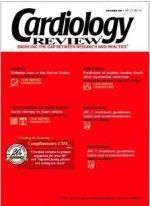Mortality rate from MI is declining in women with diabetes
NEW ORLEANS—Over the past decade, women with diabetes have benefited the most from improvements in the treatment of myocardial infarction (MI), with a reduction in the risk of death during hospitalization, according to an analysis of data from the National Registry of Myocardial Infarction (NRMI). The findings from NRMI indicate that the difference in mortality between MI patients with and without diabetes
is closing, said Darren K. McGuire, MD, MHSc, assistant professor of medicine, University of Texas Southwestern Medical Center, Dallas.
The use of evidence-based treatment approaches increased for all groups of patients enrolled in NRMI between 1994 and 2002, and this
increase was greatest for patients with diabetes, particularly women, he reported. Nevertheless, “over-
all, evidence-based treatments are underutilized in all patient subgroups,” he said. “The use of appropriate treatments for MI patients, therefore, is an area needing continued improvement.”
The first and second National Health and Nutrition Examination Surveys, conducted between 1971 and 1984, indicated an overall decrease in mortality from heart disease, but the improvement was smaller among patients with diabetes. In particular, a trend toward an increased risk of mortality was observed among women with diabetes. Possible reasons include an underappreciation of the cardiovascular consequences of diabetes and suboptimal use of evidence-based therapies in women with diabetes, said Dr. McGuire.
Whether or not similar trends among patients with diabetes exist in the setting of MI was uncertain. Therefore, data from NRMI gathered between 1994 and 2002 were analyzed to evaluate short-term mortality trends during the past decade among patients with MI according to diabetes status. The NRMI is an industry-sponsored, prospective observational study of consecutive patients with ST-elevation or non—ST-elevation MI from approximately one fourth of all acute care hospitals in the United States. Data for this analysis were available for 1,428,956 MI patients.
The prevalence of diabetes increased by 20.8% between 1994 and 2002, up to a prevalence of 30.8% by 2002. Throughout the study period, the rates of use of evidence-based therapies increased for the overall population and for all subgroups analyzed. However, the rates of aspirin, beta blocking agents, heparin, and glycoprotein IIb/IIIa inhibitor use within 24 hours of admission were lower among the diabetic patients, while angiotensin-converting enzyme inhibitor use was essentially the same in the patients with or without diabetes. Reperfusion procedures were less likely for patients with diabetes than for those without diabetes.
Hospital mortality decreased significantly among all patients during these years, but a greater decline was observed among the diabetic versus the nondiabetic cohorts (P < .001). Hospital mortality declined from 16% to 12% from 1994 to 2002 among the patients with diabetes, and from 12% to 9.5% among those without diabetes. The risk of death during hospitalization, therefore, declined by 17.9% among patients without diabetes and 26.4% among patients with diabetes. This finding “suggests that we have begun to close the ‘gap’ in outcomes between patients with and without diabetes,” said Dr. McGuire.
The greatest reduction in death rate—30.9%—was observed in women with diabetes. The overall odds ratio for mortality decreased in women from 1.28 in 1994 to 1.10 in 2002, relative to women without diabetes.
